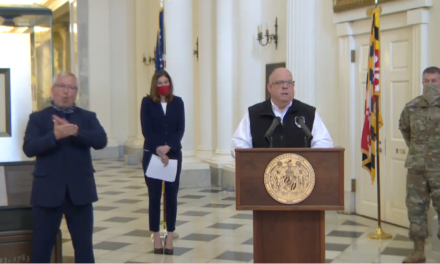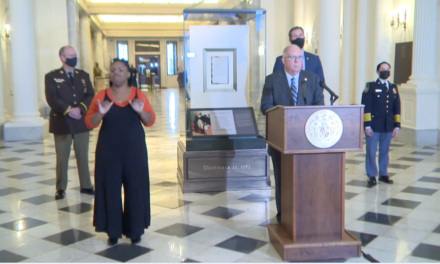By Megan Poinski
Megan@MarylandReporter.com
Marylanders agree that the state’s roads need work. According to a study to be presented at Morgan State University’s National Transportation Center Symposium today, residents say the best ways to raise new money to fix the problems are raising inspection and licensing fees for vehicles with the worst gas mileage, and then for other motorists.
They also favor directing general obligation bond money toward roads, not just money from transportation revenues.
The study found less enthusiasm for other revenue-generating measures being discussed, including raising the gasoline tax and instituting a mileage-driven highway user fee.
“I’ve often thought that people aren’t adamantly against raising user fees if it’s made clear to them what the money will be used for,” said Andrew Farkas, director of Morgan State’s National Transportation Center. “If the people know what the consequences and benefits of raising them are – if people get the full story – they will be behind it.”
Study authors Michael Callow and Nathan Austin, both professors at Morgan State’s Department of Business and Management, sent out 4,300 surveys to random residences across the state. Completed surveys were received from 450 respondents. The federal Department of Transportation paid for the research.
On a scale of 1 to 7, what do you think about these options to fund transportation?
Increase fees, not taxes
Survey respondents were asked to rank how they felt about several different funding proposals from 1 to 7, 1 meaning they strongly disagreed with implementing them, and 7 meaning they strongly agreed with implementing them.
The only proposal with a ranking above 4 – giving it an agreeable rating – was increasing inspection and licensing fees for the vehicles causing the most pollution. Study authors also categorized as favorable support increasing everyone’s registration and licensing fees and changing the focus of general obligation bond money.
With scores below 3.6, study authors categorized increasing tolls and the gas tax — use-based revenue generators – as “neutral” ways to bolster revenues for road improvements.
The study was done before the Maryland Transportation Authority’s recent toll increases were proposed. The survey broke down toll increases by type: truck-only tolls, tolls for single-occupant vehicles to use carpool lanes, new toll roads, increasing all tolls by 10%, and tolling some congested areas – like downtown streets during rush hours. People were most in favor of the truck-only tolls, which would be levied on freight vehicles, and least in favor of tolls in the congested areas.
Because of its relatively low ranking, study authors cited “lukewarm support” for increasing the gas tax, which was recently touted by business and industry leaders as the best way to improve transportation funding. People indicated that if the gas tax does increase, they would prefer to pay another cent each year, instead of indexing the gas tax to inflation.
The lowest marks were given to tax and fee increases that have nothing to do with vehicle transportation, or are new and could be unfair. Survey respondents panned increases in bus and rail fares, airport fees, and a 0.5% sales tax hike.
Using a device to track miles driven, which would assess motorists a “usage fee” based on how much they drove, received the lowest ranking. Proponents of this option say it taxes fuel-efficient vehicles more fairly than a gas tax, but survey respondents were concerned that out-of-state vehicles would not have to pay their fair share, and that the device would violate their privacy.
What is the problem?
Overall, survey respondents were not happy with the conditions of the roads in the state. On a 1 to 7 scale measuring their satisfaction with roads – 1 being satisfied and 7 being dissatisfied – the average ranking was 4.45.
The general dissatisfaction spread to all aspects of the roads, but people were most concerned with the safety of the roads. Survey results also show dissatisfaction with pollution on the roadways and traffic congestion.
Respondents were asked to use the same 1 to 7 scale to measure the priority of four reforms: improving road conditions, reducing traffic congestion, increasing road safety, and reducing air pollution. Improving road safety and road conditions were given the highest priority overall, though reducing traffic congestion was also ranked as a “high priority” item. Reducing air pollution, on the other hand, was a low-medium priority.
What next?
Austin and Callow will present their paper and its findings at Tuesday’s Transportation Symposium. Austin hopes to have it published in an academic journal.
Farkas said the symposium will give policymakers, academics, and people who are interested in transit a chance to take a look at the current problems with transportation funding and how to solve them. He said that the research, which gives scholarly insight into what Marylanders want to do to improve transportation “certainly could” make a difference in policy proposals and decisions.
The paper, which has data breaking down responses by gender, political affiliation, income and education levels, and ethnicity, is available here.





How about the fares and fees for all of the mass transit rider who benefit most from subway, commuter buses, city transit that the rural counties subsidize and never use. Let everybody feel the pain, not just the rural counties who only have auto as means of getting to work.
In that moneys are coming into the Transportation fund from Federal sources, present day gas taxes, tolls, public transportation charges and fees … it would be very helpful to see what moneys are available and what moneys are projected to be needed … for what purposes. It would be helpful to have a definition of what constitutes a “gas guzzler.” It would be helpful to know what provisions are being put in place to assure no penny of transportation moneys will be taken for other purposes … balancing the budget for example. There may well be a number of potholes on the way to Transportation fund equity.
I agree that guzzlers should be targeted with higher fees. However, there should be exemptions for vehicles that are used as registered carpools or vanpools.